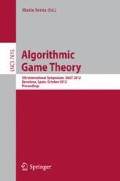Abstract
Many puzzling social behaviors, such as avoiding eye contact, using innuendos, and insignificant events that trigger revolutions, seem to relate to common knowledge and coordination, but the exact relationship has yet to be formalized. Herein, we present such a formalization. We state necessary and sufficient conditions for what we call state-dependent equilibria – equilibria where players play different strategies in different states of the world. In particular, if everybody behaves a certain way (e.g. does not revolt) in the usual state of the world, then in order for players to be able to behave a different way (e.g. revolt) in another state of the world, it is both necessary and sufficient for it to be common p-believed that it is not the usual state of the world, where common p-belief is a relaxation of common knowledge introduced by Monderer and Samet [16]. Our framework applies to many player r-coordination games – a generalization of coordination games that we introduce – and common (r,p)-beliefs – a generalization of common p-beliefs that we introduce. We then apply these theorems to two particular signaling structures to obtain novel results.
Access this chapter
Tax calculation will be finalised at checkout
Purchases are for personal use only
Preview
Unable to display preview. Download preview PDF.
References
Aaronson, S.: The complexity of agreement. In: Proceedings of the Thirty-Seventh Annual ACM Symposium on Theory of Computing, STOC 2005, pp. 634–643. ACM, New York (2005)
Andersen, H.C.: The Emperor’s New Clothes. Fairy Tales Told for Children - First Collection (1837)
Aumann, R.J.: Agreeing to Disagree. The Annals of Statistics 4(6), 1236–1239 (1976)
Binmore, K.: Game theory - a very short introduction. Clarendon Press (2007)
Carlsson, H., van Damme, E.: Global Games and Equilibrium Selection. Econometrica 61(5), 989–1018 (1993)
Chwe, M.S.-Y.: Rational Ritual: Culture, Coordination, and Common Knowledge. Princeton University Press (2003)
Dwork, C., Moses, Y.: Knowledge and common knowledge in a byzantine environment: Crash failures. Information and Computation 88(2), 156–186 (1990)
Fagin, R., Halpern, J.Y.: Reasoning about knowledge and probability. J. ACM 41(2), 340–367 (1994)
Friedell, M.F.: On the structure of shared awareness. Behavioral Science 14(1), 28–39 (1969)
Geanakoplos, J.: Common knowledge. Journal of Economic Perspectives 6(4), 53–82 (1992)
Halpern, J.Y., Moses, Y.: Knowledge and common knowledge in a distributed environment. J. ACM 37(3), 549–587 (1990)
Halpern, J.Y., Moses, Y.: A guide to completeness and complexity for modal logics of knowledge and belief. Artif. Intell. 54(3), 319–379 (1992)
Halpern, J.Y., Tuttle, M.R.: Knowledge, probability, and adversaries. J. ACM 40(4), 917–960 (1993)
Harsanyi, J.C., Selten, R.: A General Theory of Equilibrium Selection in Games. MIT Press Books, vol. 1. The MIT Press (1988)
Lewis, D.: Convention: A Philosophical Study. Harvard University Press, Cambridge (1969)
Monderer, D., Samet, D.: Approximating common knowledge with common beliefs. Games and Economic Behavior 1(2), 170–190 (1989)
Morris, S.: Coordination, communication and common knowledge: A retrospective on electronic mail game. Oxford Review of Economic Policy 18(4) (February 2002)
Morris, S., Shin, H.S., Yale University. Cowles Foundation for Research in Economics: Global games: theory and applications. Cowles Foundation discussion paper. Cowles Foundation for Research in Economics (2000)
Morris, S., Shin, H.S.: Unique equilibrium in a model of self-fulfilling currency attacks. American Economic Review 88(3), 587–597 (1998)
Morris, S., Shin, H.S.: Rethinking multiple equilibria in macroeconomic modeling. In: NBER Macroeconomics Annual 2000, vol. 15, NBER Chapters, pp. 139–182. National Bureau of Economic Research, Inc. (June 2001)
Perry, S., Manson, J.: Manipulative Monkeys: The Capuchins of Lomas Barbudal. Harvard University Press (2008)
Pinker, S., Nowak, M.A., Lee, J.J.: The logic of indirect speech. PNAS 105(3), 833–838 (2008)
Rubinstein, A.: The electronic mail game: Strategic behavior under “almost common knowledge”. American Economic Review 79(3), 385–391 (1989)
Author information
Authors and Affiliations
Editor information
Editors and Affiliations
Rights and permissions
Copyright information
© 2012 Springer-Verlag Berlin Heidelberg
About this paper
Cite this paper
Dalkiran, N.A., Hoffman, M., Paturi, R., Ricketts, D., Vattani, A. (2012). Common Knowledge and State-Dependent Equilibria. In: Serna, M. (eds) Algorithmic Game Theory. SAGT 2012. Lecture Notes in Computer Science, vol 7615. Springer, Berlin, Heidelberg. https://doi.org/10.1007/978-3-642-33996-7_8
Download citation
DOI: https://doi.org/10.1007/978-3-642-33996-7_8
Publisher Name: Springer, Berlin, Heidelberg
Print ISBN: 978-3-642-33995-0
Online ISBN: 978-3-642-33996-7
eBook Packages: Computer ScienceComputer Science (R0)

